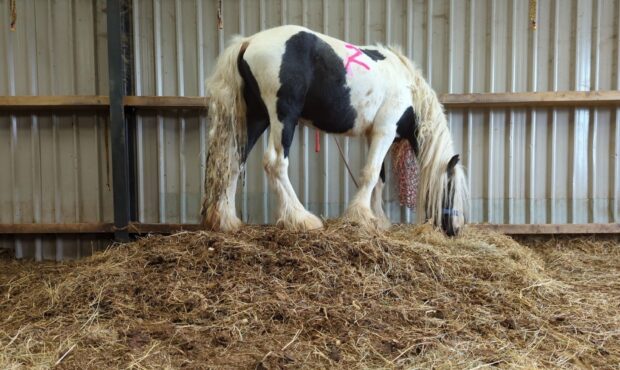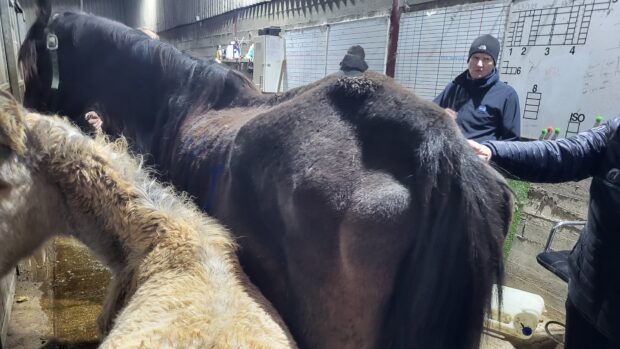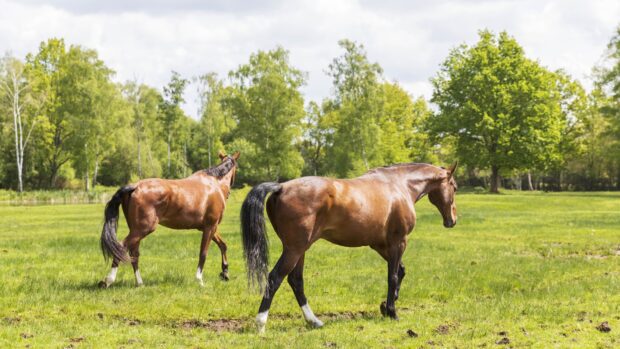Three people have been sentenced for giving horses a “lifetime of misery” in a field full of hazards and strewn with dead and rotting equine bodies.
John Dunn, of Dering Way, Gravesend, did not attend Medway Magistrates’ Court for his trial, and was sentenced in his absence on 13 July for four counts of animal cruelty.
The 34-year-old was given a 26-week prison sentence and banned from keeping equines for 10 years for the offences, which related to “a number of sick horses kept in horrific conditions”.
RSPCA inspector Paul Taylor said the charges were related to 13 horses, part of a large group kept in a field near Dering Way.
“The field did not have enough grazing to sustain the numbers, and it was riddled with litter and hazards such as barbed wire, plastic bags and plastic netting,” said an RSPCA spokesman. “The main water source was a dyke contaminated due to decaying horses’ remains, and it was green and full of rubbish.”

The RSPCA found “a large number” of decomposing equine carcasses in the field, as well as a drain six feet deep, with no manhole cover.
Horses in the field had parasites, were in poor condition and had no extra food, while five more were shut in containers.
“There was no natural light, the tiny space was filled with faeces and the equines had little or no fresh water or food,” said the spokesman.

On 16 February 2017, four horses had been removed, two “exceptionally sick” equines put to sleep on the scene and 10 dead bodies found. On 9 March 32 horses were removed from two fields in the area, following an operation also involving police, vets and the British Horse Society.
At the start of Dunn’s trial, Bridget Saunders, of the same address, had pleaded guilty to two animal welfare offences concerning a number of horses. The 31-year-old was banned from keeping equines for three years and given a conditional discharge “in view of her personal circumstances”. She was ordered to pay £100 costs and a £30 surcharge.
A third defendant, Ronnie Vine of Havengore Avenue, whose two horses were in a different field to the main herd, pleaded guilty to one animal welfare offence, on 13 July.
The 56-year-old was banned from keeping equines for one year and ordered to pay £1,200 costs, a £200 fine and a £30 surcharge.
In mitigation, the court heard Vine cares for his sick wife, that he “took his eye off the ball” owing to an illness, and that his life revolves around horses and horse fairs.
Saunders co-operated with the RSPCA and had “learned her lesson”. She had been given the horses as therapy for her son, and had financial issues.
In Dunn’s mitigation, it was pointed out that he was not responsible for all the horses, as some belonged to the other defendants.
RSPCA inspector Rosie Russon said after the case: “Many of the horses taken were just youngsters and had probably only known a life of misery, sickness and riddled with worms. It is such an awful shame that in this day and age, we are still seeing cases of animal cruelty of this scale.

“I was truly horrified at the sheer number of horses being kept in such terrible conditions in one small location, the horrors were clear for all to see – yet despite this the owners failed to make improvements for them.
“This is one of the largest number of horses that the RSPCA has taken into its care in the Kent area in recent years, and I am pleased to say that almost all the horses are now doing exceptionally well.
“But it has been a long road to recovery for many of them. They have been treated for parasites and other ailments and are now in herds with more than enough grazing and plenty of loving attention, a stark contrast to their previous lives.
“Six of the mares were pregnant when removed and they have all given birth to healthy, happy foals.”
Ms Russon thanked the police and BHS for their support in the “very complex and very difficult operation”.
“In Kent the horse crisis is something we as officers are having to face almost every day, and recent figures released by the RSPCA revealed that this county had the highest number of equines collected in the whole of the country [76] last year,” she added.
“Sadly, the horse crisis is still showing no signs of easing up, and we and horse charities across the region continue to have to pick up the pieces as a result of owners not meeting the basic welfare needs of their equines.
Continues below…

Donkeys rescued from ‘farm of horrors’
It was one of the worst cases of animal neglect the team had seen

Donkey attached to parachute in name of advertising
Onlookers watched in horror as a donkey was dragged off into the sky from a beach in Russia

Shocking amputation videos emerge online *graphic content*
Disturbing videos of amputation of parts of the lower limbs of Middle Eastern endurance horses have provoked concern *warning graphic
“We know people find it frustrating when they see a horse they believe to be suffering and they contact us to take action, but we can only ever act within the law, and we cannot just remove them unless a vet confirms they are suffering and the police seize them.
“I hope this case sends out a clear message and reassures the public that when the RSPCA has sufficient evidence to bring animal welfare offenders before the courts, we will.”
For all the latest news analysis, competition reports, interviews, features and much more, don’t miss Horse & Hound magazine, on sale every Thursday.




